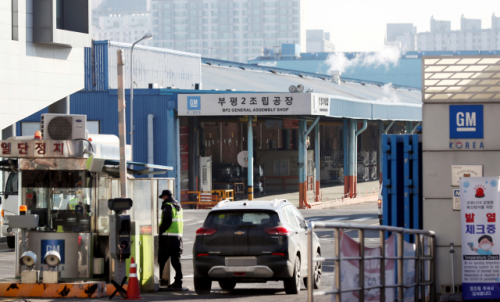“More than 100 semiconductors than normal internal combustion vehicles”
GM Korea Bupyeong 2 plant cut production by 50% next month
 viewer
viewer
While the shortage of automotive semiconductors is expected to prolong for more than six months, domestic automakers are also concerned about production disruptions. GM Korea plans to continue production cuts next month, and Hyundai and Kia are operating production lines centering on models that have semiconductor stock.
According to industry sources on the 28th, GM Korea plans to operate only half of its Bupyeong 2 plant by mid-next month, and then report on the supply and demand of semiconductors for vehicles, and then decide on a production plan. GM Korea has been operating only 50% of its Bupyeong 2 plant, which produces Chevrolet Malibu and Trax from the 8th. The Bupyeong Plant 1 and the Changwon Plant are in normal operation.
Previously, General Motors (GM) extended production cuts for three assembly plants in North America until at least mid-March due to a shortage of automotive semiconductors. In addition to GM, major global automakers such as Toyota, Volkswagen, Stellaantis, Ford, Renault, Subaru, Nissan, Honda and Mazda were also hit directly. It is reported that Tesla has also stopped production of the model 3, a popular sedan, for the last two weeks.
Hyundai Motors and Kia also have no plans to cut production so far, but as the sense of crisis over production disruption has risen, they are inspecting vehicle semiconductor inventory on a weekly basis and operating production lines centering on models in stock.
Hyundai Motor Company and Kia are receiving automotive semiconductor-applied parts from component partners such as Bosch, Continental and Hyundai Mobis. In addition, rather than entrusting only the primary suppliers to secure inventory, they are directly negotiating with semiconductor manufacturers to secure the quantity of semiconductors for vehicles. An industry official said, “Hyundai Motor and Kia seem to be working hard to prevent disruptions as much as possible while adjusting production plans, such as prioritizing production of popular models with the current inventory.”
 viewer
viewer
In the industry, there are also concerns that this situation will cause a disruption in mass production of the first exclusive electric car’Ioniq 5’that Hyundai Motor Company unveiled on the 23rd. Ionic 5 set a new record of 23,000 units from the first day of the pre-contract, and has reached its sales target (26,500 units) this year.
Ioniq 5 is a model that Hyundai Motors announced this year as the first year of electric vehicle leap forward, so if it cannot meet the crowded demand, it will inevitably damage its corporate image.
An industry official said, “Electric vehicles contain at least 100 more semiconductors than general internal combustion locomotives.”
Recently, market information company IHS Markit predicted that automobile production in the first quarter of this year will be delayed by nearly 1 million units due to a disruption in the automobile semiconductor supply chain.
The industry predicts that the disruption in supply and demand for vehicle semiconductors will continue for more than six months until the third quarter of this year. This is because automotive semiconductors are less profitable than other system semiconductors, and it is difficult to increase supply in a short period of time because it is not easy to enter new companies due to the burden of defects, safety accidents, and recalls.
In addition, as major automotive semiconductor companies such as NXP and Infineon stop operating their lines due to the record blackout in the US, the global automotive semiconductor supply and demand situation is expected to worsen.
/ Reporter Park Dong-hui [email protected]
< 저작권자 ⓒ 서울경제, 무단 전재 및 재배포 금지 >
